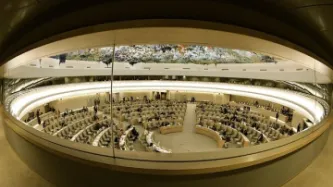Search
Content type: News & Analysis
Today’s report on the right to privacy in the digital age by the UN High Commissioner on Human Rights, commissioned by the General Assembly in December 2013, marks an historic turning point in the international discourse around privacy and surveillance.
Privacy International believes the report will dramatically change the international conversation on the implications of surveillance and intelligence for human rights. Most importantly, it puts beyond doubt that the very existence of…
Content type: News & Analysis
What do Egypt, Kenya, Turkey, Guinea, and Sweden have in common? Despite having a Constitutional right to privacy, they are adopting and enforcing policies that directly challenge this human right.
These states are also up for a Universal Periodic Review this year before the United Nations Human Rights Council. UPRs are a mechanism within the Council aimed at improving the human rights situation in all countries and address human rights violations wherever they occur.
Despite having…
Content type: News & Analysis
In response to a consultation being undertaken by the UN in accordance with December’s General Assembly resolution on the right to privacy in the digital age, Privacy International today called on the United Nations to recognise that mass surveillance is incompatible with human rights.
The submission to the Office of the High Commissioner to Human Rights confronts some of the biggest challenges to the right to privacy in the digital age, debunks some of the justifications put forth…
Content type: News & Analysis
In the late eighteenth century in Germany, ‘anthropologist’ Johann Blumenbach published a degenerative hypothesis that linked cranium and facial profiles to supposed character traits and accordingly divided human beings into five different races: the Caucasian, Mongolian, Malayan, Ethiopian, and American.1
In the 1870s, Alphonse Bertillon, a police officer in France, started a trend to identify criminals based on facial characteristics, alongside subsequent use of the camera to…



